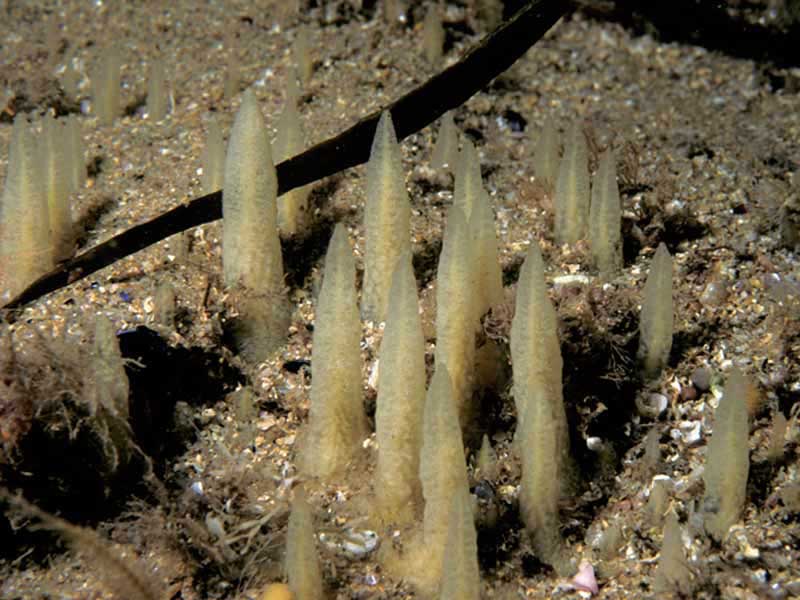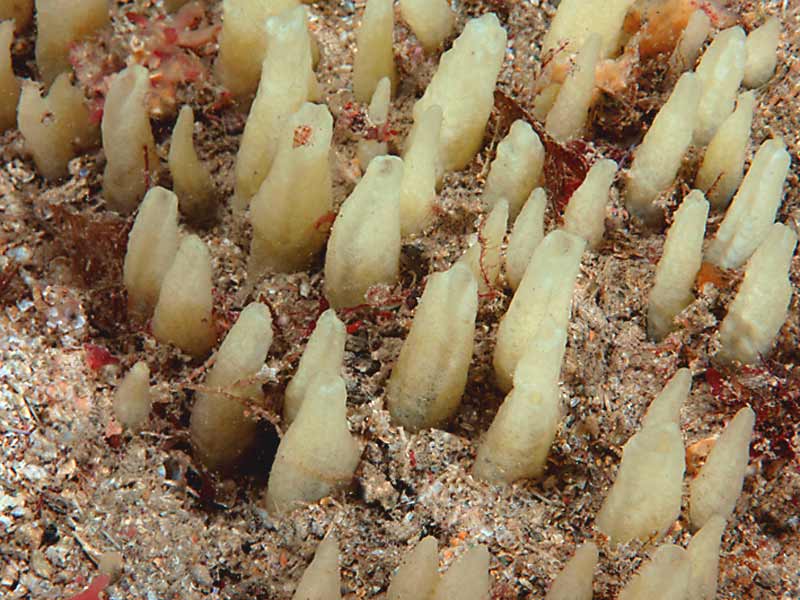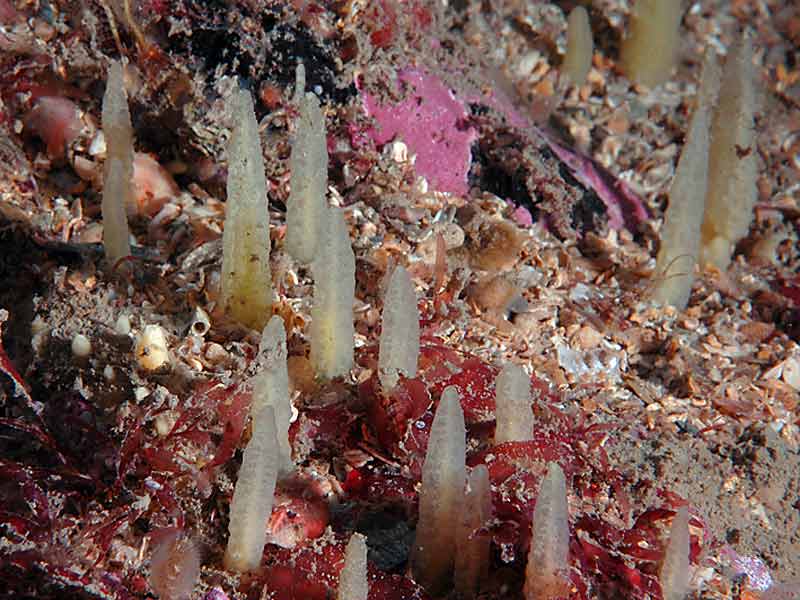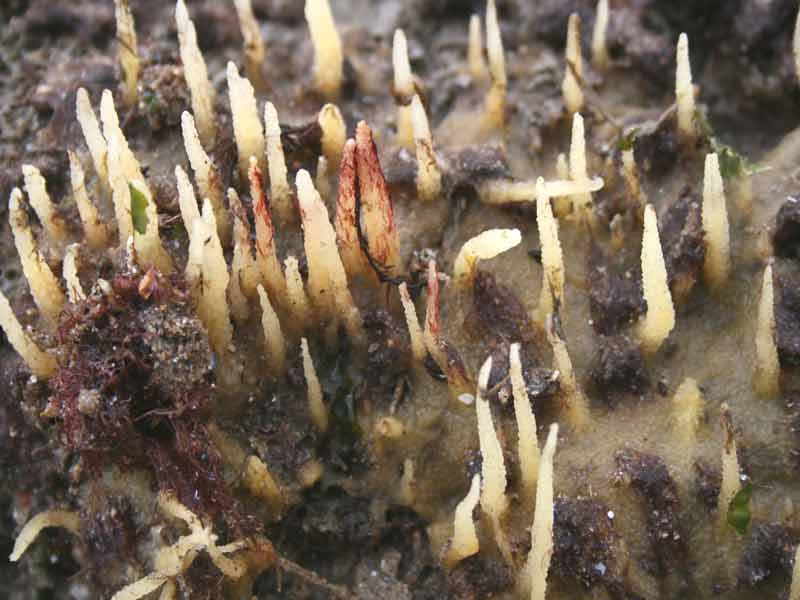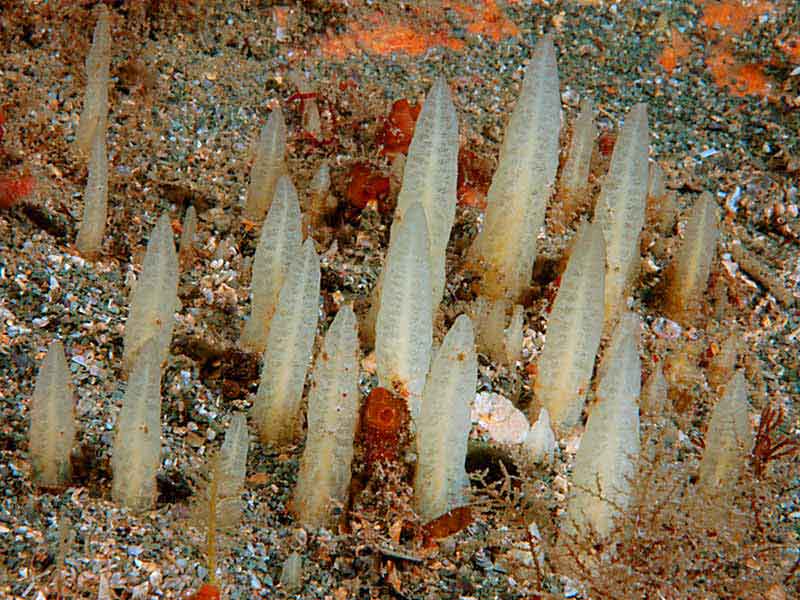Cored chimney sponge (Ciocalypta penicillus)
Distribution data supplied by the Ocean Biodiversity Information System (OBIS). To interrogate UK data visit the NBN Atlas.Map Help
| Researched by | Olwen Ager | Refereed by | Admin |
| Authority | Bowerbank, 1862 | ||
| Other common names | - | Synonyms | - |
Summary
Description
Ciocalypta penicillus forms an encrusting cushion, usually about 10 cm in diameter, with a rough upper surface. Firm, but flexible, pointed, conical projections or digits grow upwards from the base. These projections are about 5 cm high and 0.5 cm wide. The cushions are brownish or whitish-yellow in colour, while the digits are usually translucent.
Recorded distribution in Britain and Ireland
Ciocalypta penicillus is found on the west and south coasts of Britain and at various locations around the coast of Ireland.Global distribution
Ciocalypta penicillus is found from Denmark to the Mediterranean, including the Azores and Madeira.Habitat
Ciocalypta penicillus is usually found attached to upward facing rock surfaces typically covered in clean sand or gravel but sometimes more silty sediment.Depth range
SubtidalIdentifying features
- Brown or whitish-yellow encrusting cushion up to 10 cm in diameter.
- Pointed conical digits project upwards from base.
- Basal cushion often covered in sand or gravel.
Additional information
The basal cushion is often covered by sand or gravel so only the digits are visible.
Listed by
- none -
Bibliography
Gibson, R., Hextall, B. & Rogers, A., 2001. Photographic guide to the sea and seashore life of Britain and north-west Europe. Oxford: Oxford University Press.
Hayward, P.J. & Ryland, J.S. (ed.) 1995b. Handbook of the marine fauna of North-West Europe. Oxford: Oxford University Press.
Howson, C.M. & Picton, B.E., 1997. The species directory of the marine fauna and flora of the British Isles and surrounding seas. Belfast: Ulster Museum. [Ulster Museum publication, no. 276.]
JNCC (Joint Nature Conservation Committee), 1999. Marine Environment Resource Mapping And Information Database (MERMAID): Marine Nature Conservation Review Survey Database. [on-line] http://www.jncc.gov.uk/mermaid
Picton, B.E. & Costello, M.J., 1998. BioMar biotope viewer: a guide to marine habitats, fauna and flora of Britain and Ireland. [CD-ROM] Environmental Sciences Unit, Trinity College, Dublin.
Datasets
Manx Biological Recording Partnership, 2022. Isle of Man historical wildlife records 1990 to 1994. Occurrence dataset:https://doi.org/10.15468/aru16v accessed via GBIF.org on 2024-09-27.
NBN (National Biodiversity Network) Atlas. Available from: https://www.nbnatlas.org.
OBIS (Ocean Biodiversity Information System), 2025. Global map of species distribution using gridded data. Available from: Ocean Biogeographic Information System. www.iobis.org. Accessed: 2025-08-08
South East Wales Biodiversity Records Centre, 2023. SEWBReC Marine and other Aquatic Invertebrates (South East Wales). Occurrence dataset:https://doi.org/10.15468/zxy1n6 accessed via GBIF.org on 2024-09-27.
Citation
This review can be cited as:
Last Updated: 29/04/2008

